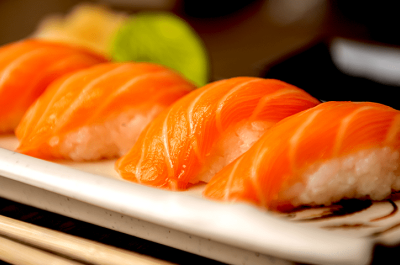What to eat for a healthy vegetarian pregnancy
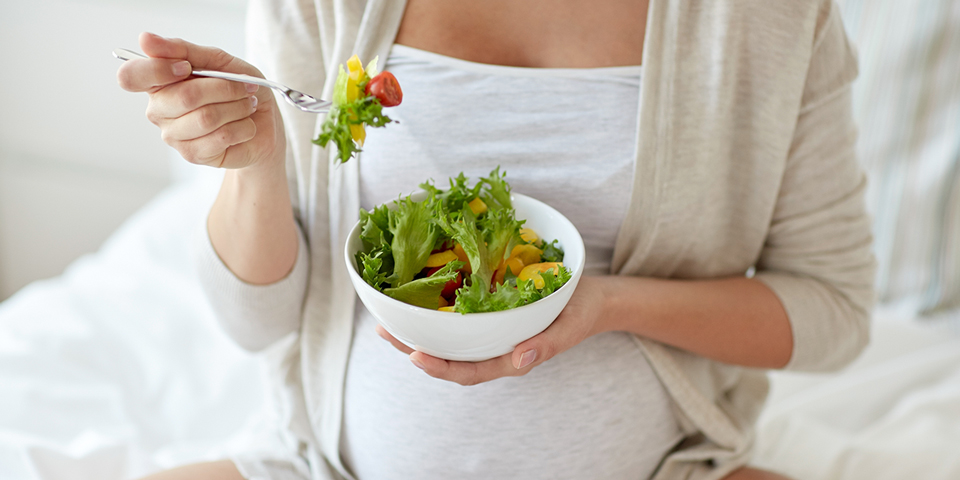
If you’re vegetarian and trying to conceive or pregnant, you may have fielded questions from well- meaning friends and family about your diet: “Aren’t you worried about getting the right nutrients?” “Have you started craving meat?” While these interrogations can be annoying, you may have your own questions about which foods to eat to help promote a healthy pregnancy. Let’s explore.
Is it safe to have a vegetarian pregnancy?
Yes! According to the Academy of Nutrition and Dietetics, a well-planned vegetarian diet “can meet the nutrient needs of people from all stages of life,” including pregnancy.1 The key? Making sure you’re getting the proper amount of nutrients.1
A review of scientific literature published in Nutrients in 2019 confirmed that while vegetarians are at risk for nutritional deficiencies, as long as they keep eating foods that give them an adequate amount of nutrients, pregnancy outcomes are similar to those who eat meat.2 If you’re wondering how much of each type of nutrient you need while pregnant, we’ve outlined the recommended daily amounts below. Your healthcare provider may suggest supplementing your prenatal vitamin if you need more of certain nutrients.3
Will eating vegetarian make it harder to get pregnant?
Not only is there no research to suggest that vegetarianism is a cause of infertility, but some research also indicates a diet rich in plants may improve fertility. In 2020, researchers from the Harvard T.H. Chan School of Public Health and Harvard Medical School published a review of past studies looking at the impact of diet and fertility and found that folic acid, vitamin B12 and omega-3 fatty acids (all of which can be found in vegetarian foods) and a healthy diet (noting the Mediterranean diet in particular) are all connected to positive effects on fertility.4
Additionally, a 2021 study in Advances in Nutrition pointed to increasing evidence linking diet to fertility, noting that a Mediterranean diet rich in dietary fiber, omega-3 fatty acids, plant-based protein, and vitamins and minerals has a positive impact on female fertility.5
What is the ideal vegetarian pregnancy meal plan?
An ideal vegetarian pregnancy meal plan is one that includes a varied diet that focuses on getting enough key nutrients and an adequate amount of protein.6-8 Taking a prenatal vitamin with folic acid is important whether you are vegetarian or not.6,7 Talk to your healthcare provider or consult a dietitian to determine if you need additional supplements.6 The American College of Obstetricians and Gynecologists (ACOG) recommends that vegetarians take a vitamin B12 supplement, which is essential for the fetus’s development.7 ACOG recommends a supplement for vegetarians because the main sources for vitamin B12 are meat, fish, poultry and milk.7
Pay attention to the nutrients you are consuming, most of which you can get from food you likely already enjoy daily.7,8 Below is a list of commonly recommended nutrients you may need while pregnant, including those most typically found in meat and their vegetarian alternatives. For a more personalized nutrients plan that takes into account your individual needs, talk to your healthcare provider.
| Iodine7 | Seafood, beef liver, chicken7,9 | Iodized table salt, dairy products, some fortified breads, eggs, seaweed 7,9 | 220 mcg 7 |
|
Iron7,8 |
Lean red meat, poultry, fish7 |
Dried beans and peas, iron- fortified cereals, prune juice, blackstrap molasses, lentils, tofu or tempeh, spinach, Swiss chard7,10 |
27 mg7,8 |
|
Vitamin B67 |
Beef, liver, pork, ham7 |
Bananas, whole-grain cereals, chickpeas, dark-green leafy vegetables, papayas, oranges, cantaloupes7,11 |
1.9 mg7 |
|
Vitamin B127,8 |
Meat, poultry, fish7 |
Milk, eggs, fortified breakfast cereals, fortified nutritional yeast7,12 |
2.6 mcg7,8 |
|
Vitamin D7 |
Salmon, swordfish, tuna fish, cod liver oil, beef liver7,13 |
Sunlight, fortified dairy, plant products and milks, fortified orange juice, egg yolk, fortified cereals7,13 |
600 IU7 |
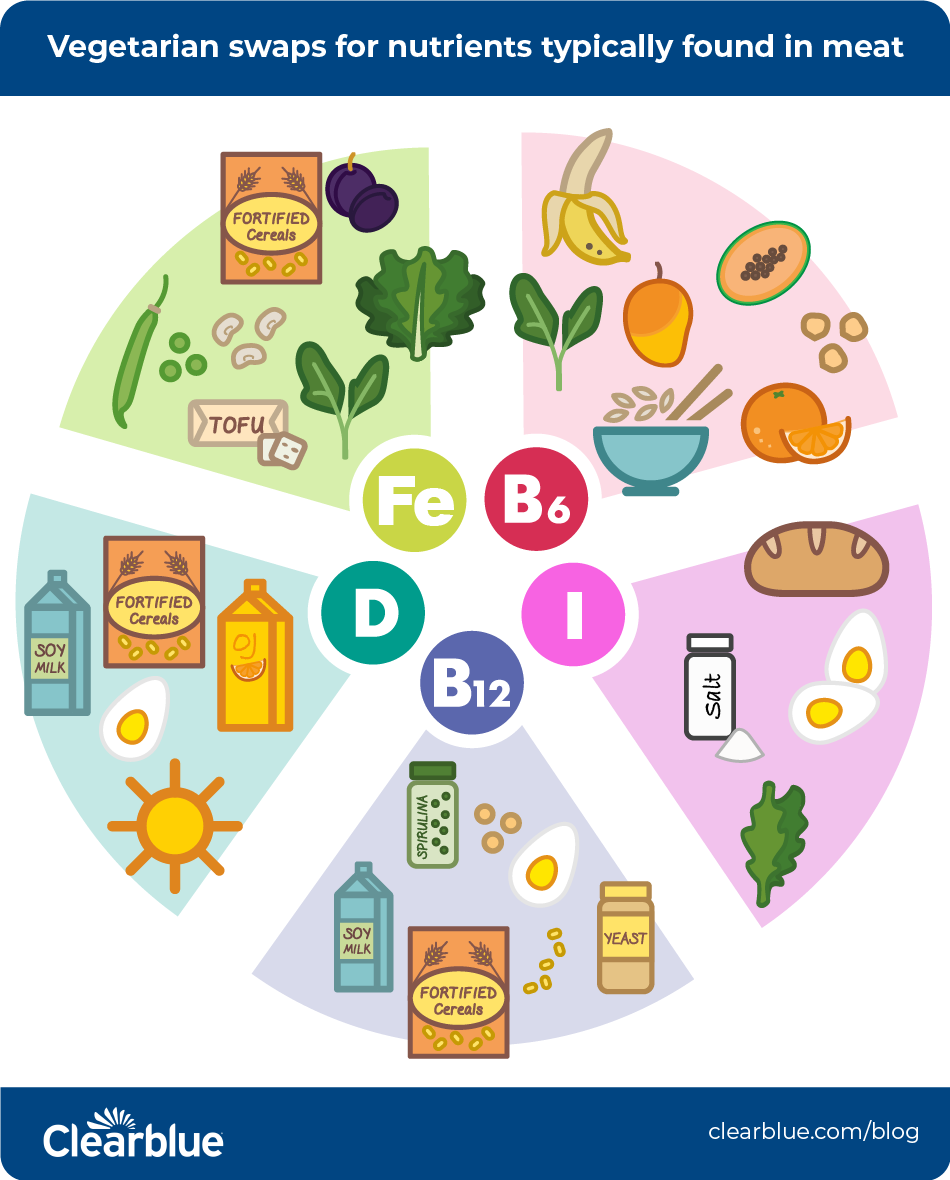
And as we said above, many vegetarian foods already contain many of the nutrients you need for a healthy pregnancy:
| Nutrient | Typically found in | Recommended daily amount |
| Calcium7,8 | Milk, cheese, yogurt, dark-green leafy vegetables7 | 1,000 mg7,8 |
| Choline7 | Milk, eggs, peanuts, soy products7 | 450 mg7 |
| Folic acid7,8 | Fortified cereals, enriched breads and pastas, peanuts, orange juice, beans, dark-green leafy vegetables7 | 400-800 mcg7,8 |
| Vitamin A7,8 | Sweet potatoes, carrots,green leafy vegetables7 | 770 mcg7,8 |
| Vitamin C7 | Citrus fruit, strawberries,tomatoes, broccoli7 | 85 mg7 |
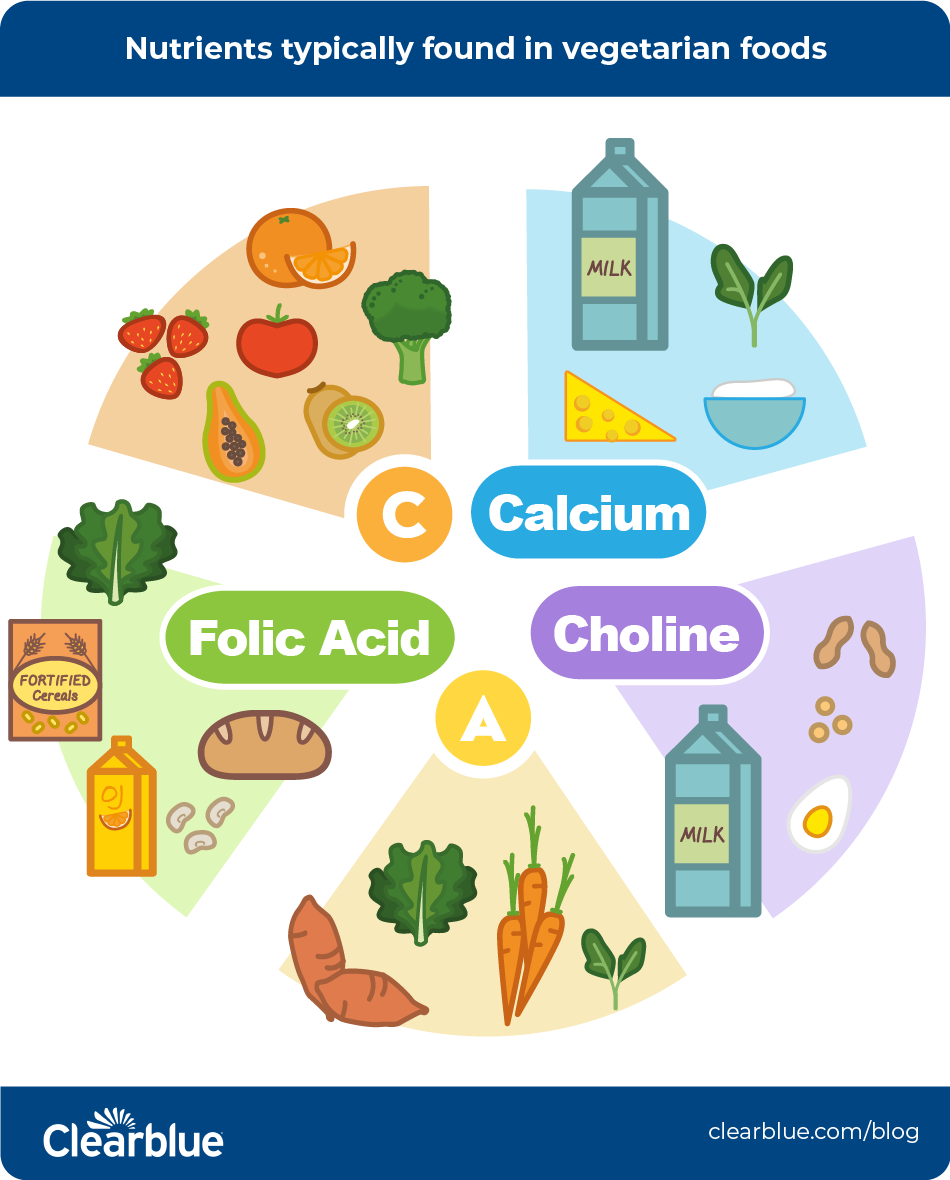
What vegetarian prenatal vitamins should I take?
First and foremost, it’s best to talk to your healthcare provider about which prenatal vitamins are best for your needs. In general, some prenatal vitamins are designed for people who don’t eat meat. Your doctor is in the best position to recommend which vitamins to take and how much you need for a healthy pregnancy.
Maintaining a vegetarian diet while TTC and throughout your pregnancy is safe and relatively simple. Talk to your healthcare provider, take a daily prenatal vitamin and any additional supplements as recommended by your healthcare provider, and plan ahead to make sure you eat the proper amount of nutrients daily.
Related Articles
Sources
- Caspero A, Klemm S, Academy of Nutrition and Dietetics. Building a healthy vegetarian diet: myths and facts. Updated September 27, 2021. Accessed April 4, 2023. https://www.eatright.org/health/wellness/vegetarian-and-plant-based/building-a-healthy- vegetarian-diet-myths
- Sebastiani G, Herranz Barbero A, Borrás-Novell C, et al. The effects of vegetarian and vegan diet during pregnancy on the health of mothers and offspring. Nutrients. 2019;11(3):557. doi: 10.3390/nu11030557. Accessed April 4, 2023. https://www.ncbi.nlm.nih.gov/pmc/articles/PMC6470702/
- March of Dimes. Vitamins and other nutrients during pregnancy. Updated September 2020. Accessed April 4, 2023. https://www.marchofdimes.org/find-support/topics/pregnancy/vitamins-and-other-nutrients-during-pregnancy
- Shmerling RH, Harvard Health Publishing. Fertility and diet: is there a connection? Updated November 3, 2020. Accessed April 4, 2023. https://www.health.harvard.edu/blog/fertility-and-diet-is-there-a-connection-2018053113949
- Skoracka K, Ratajczak AE, Rychter AM, Dobrowolska A, Krela-Kaźmierczak I. Female fertility and the nutritional approach: the most essential aspects. Adv. Nutr. 2021;12(6), 2372-2386. doi: 10.1093/advances/nmab068. Accessed April 4, 2023. https://academic.oup.com/advances/article/12/6/2372/6303415
- Cleveland Clinic. Can you safely have a vegetarian pregnancy? Updated July 8, 2020. Accessed April 4, 2023. https://health.clevelandclinic.org/can-you-safely-have-a-vegetarian-pregnancy/
- The American College of Obstetricians and Gynecologists. Nutrition during pregnancy. Updated May 2023. Accessed June 12, 2023. https://www.acog.org/womens-health/faqs/nutrition-during-pregnancy
- Office on Women’s Health, U.S. Department of Health & Human Services. Staying healthy and safe. February 22, 2021. Accessed April 4, 2023. https://www.womenshealth.gov/pregnancy/youre-pregnant-now-what/staying-healthy-and- safe
- Harvard T.H. Chan School of Public Health. Iodine. Updated March 2023. Accessed April 4, 2023. https://www.hsph.harvard.edu/nutritionsource/iodine/
- WebMD. Top foods high in iron for vegans. Updated November 22, 2022. Accessed April 4, 2023. https://www.webmd.com/diet/foods-high-iron-vegans
- Harvard T.H. Chan School of Public Health. Vitamin B6. Updated March 2023. Accessed April 4, 2023. https://www.hsph.harvard.edu/nutritionsource/vitamin-b6/
- National Institutes of Health, U.S. Department of Health & Human Services. Vitamin B12. Updated December 22, 2022. Accessed April 4, 2023. https://ods.od.nih.gov/factsheets/VitaminB12-HealthProfessional
- Harvard T.H. Chan School of Public Health. Vitamin D. Updated March 2023. Accessed April 4, 2023. https://www.hsph.harvard.edu/nutritionsource/vitamin-d/
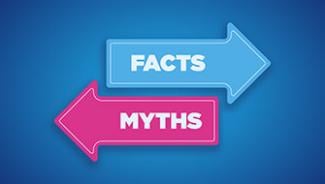
Myths or facts?
"I can get pregnant at any time of the month."
"A menstrual cycle is always 28 days long."
Discover the truth about "facts" you may take for granted!




